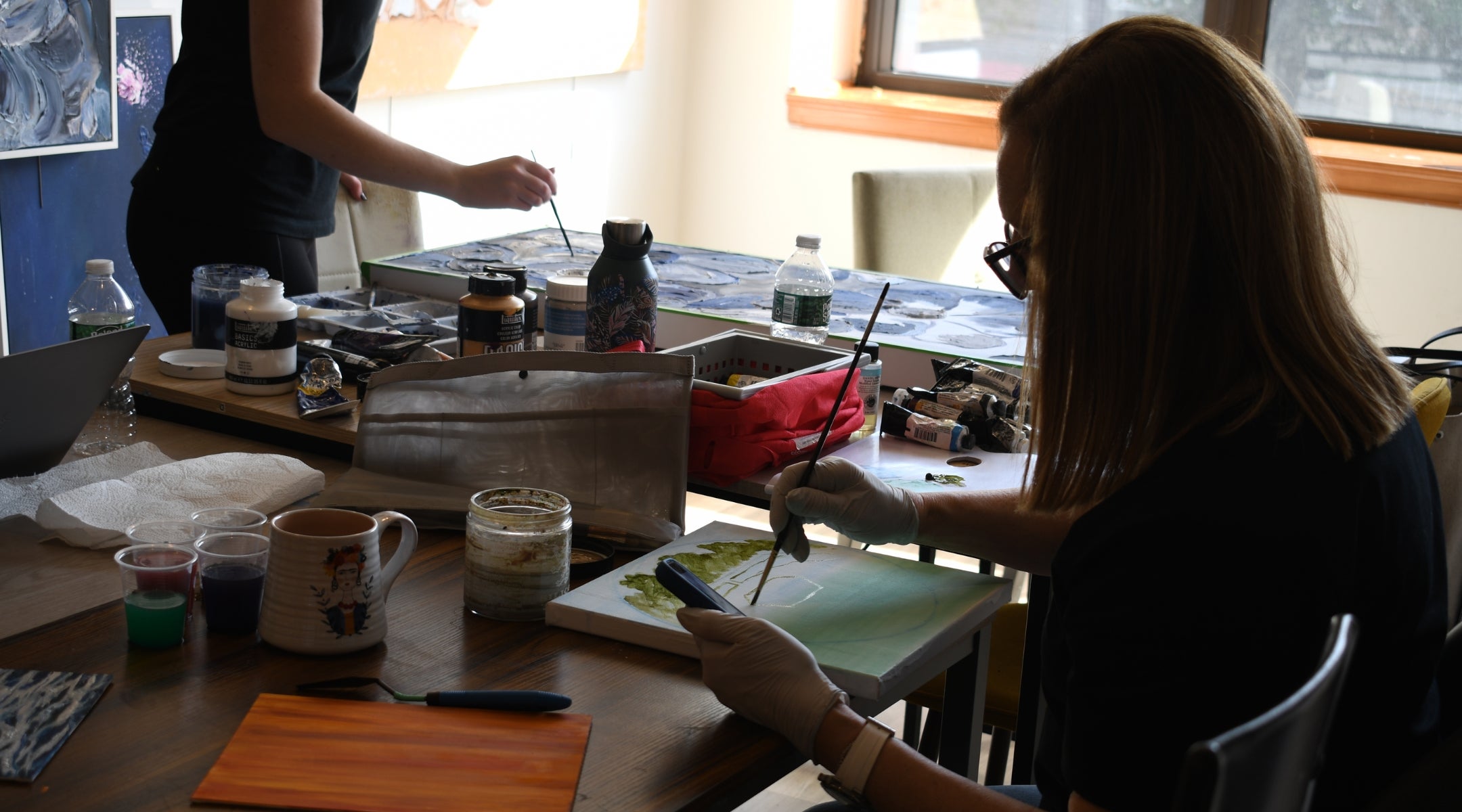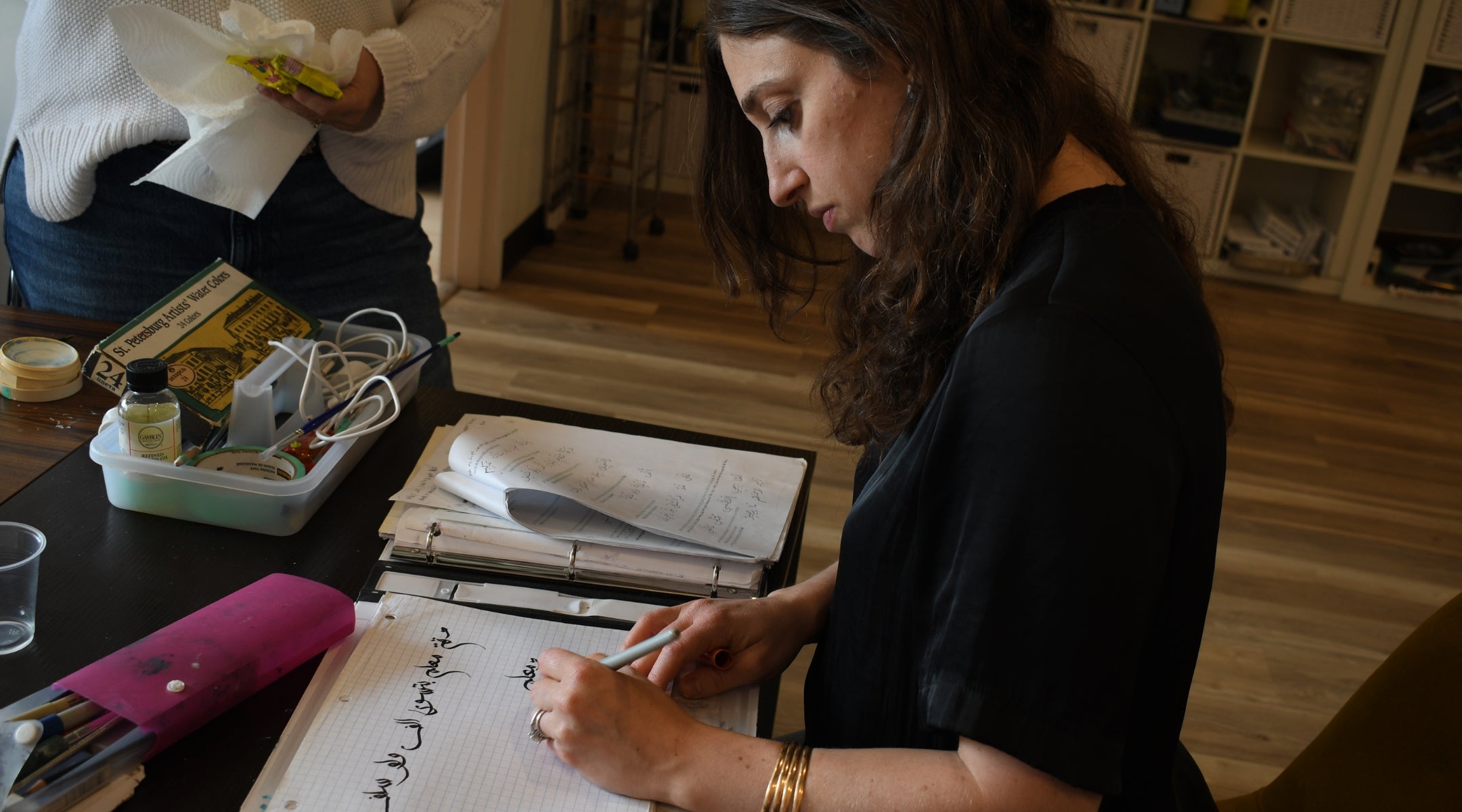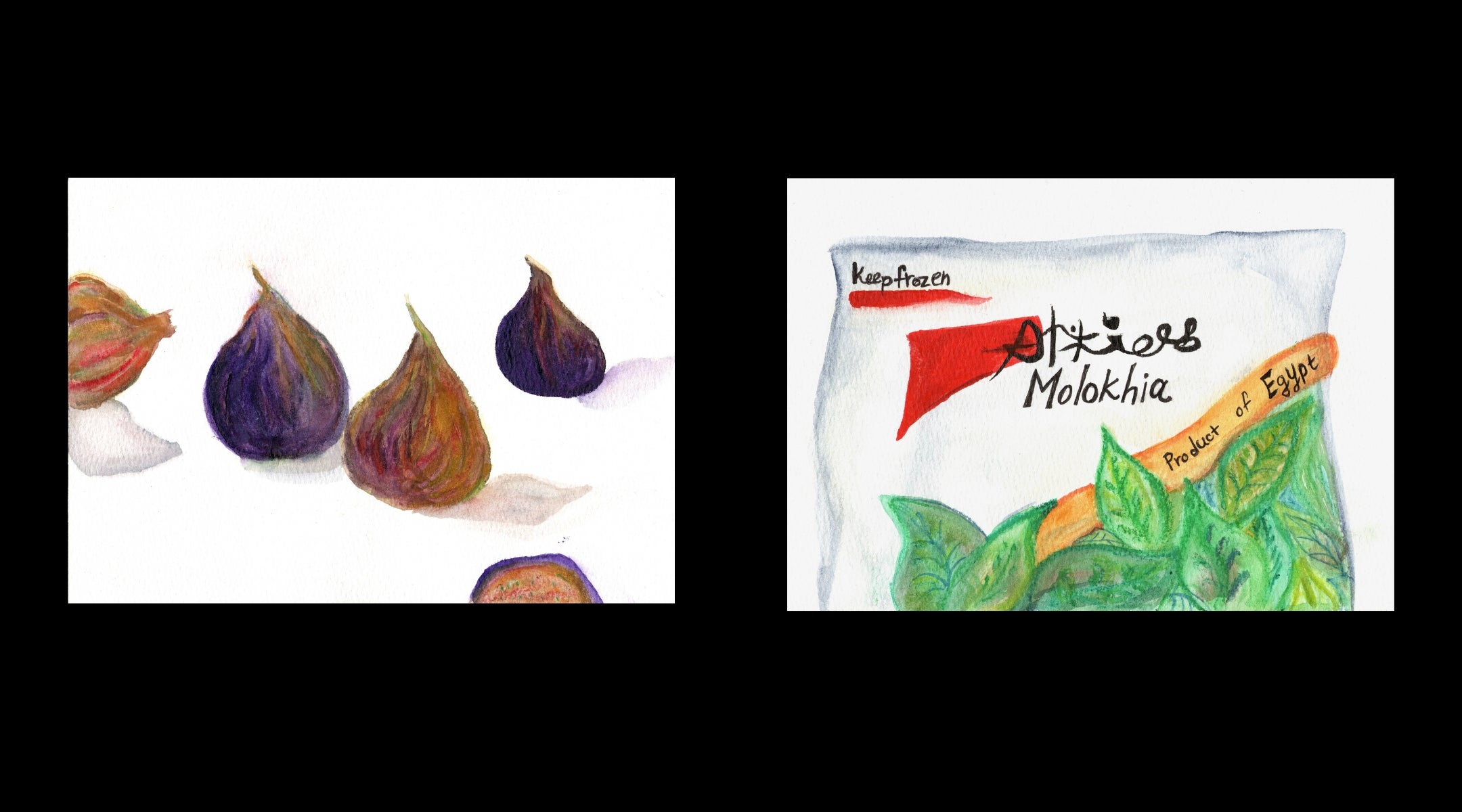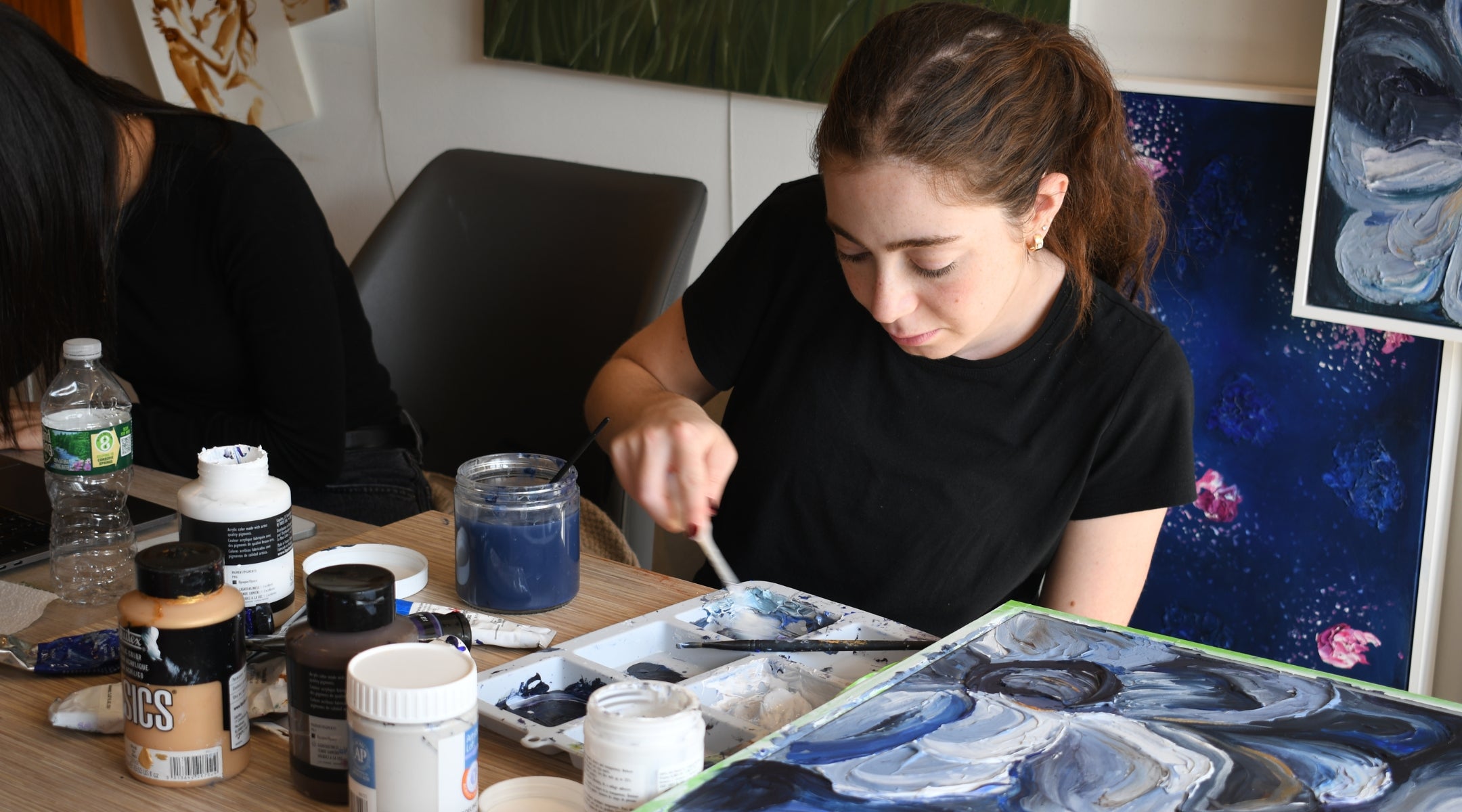Uncategorized
In Brooklyn, a shared studio empowers Mizrahi women artists

On the second floor of a nondescript commercial building in Gravesend, Brooklyn, is a small artists’ studio. There, four long wooden tables are pushed together to create one massive table covered with oil paints, canvases, watercolors and other tools of the trade. The white walls are adorned with dozens of drawings and paintings; along one wall, a dozen cubbies are filled with even more art supplies.
It could be one of countless shared studio spaces for artists that are hidden in corners throughout the five boroughs. But this particular space is designed expressly for Jewish women artists: It’s closed on Shabbat and Jewish holidays, and among the art and design books on the shelves are siddurs, or prayer books.
Welcome to Muse Brooklyn, a coworking space built by and for Jewish women artists. The brainchild of Lenore Mizrachi-Cohen, a conceptual artist and observant Jew, the space doubles as an arts event space for its corner of Brooklyn, which is home to a significant Syrian Jewish community. Some 38,200 and 55,000 Syrian Jews live in the surrounding neighborhoods, according to a recent study commissioned by JIMENA, a nonprofit that advocates Middle Eastern and North African Jews — and, so far, all seven members of the shared studio are Mizrahi Jews.
“I initially started it for my own needs,” said Cohen, a 35-year-old married mother of four who has been working as an artist and calligrapher for 15 years.
Cohen was inspired to create Muse after a stint, in 2019, at a women-only art studio in Jerusalem. That shared space — which was designed for religious women often facing communal pressures against their artistic pursuits — opened her eyes to what a neighborhood studio for women like her could look like.
“It was 12 minutes away from my house, and it was a very supportive environment,” Cohen recalled. When she returned to New York she sought something similar in Brooklyn, but didn’t find it. “That’s when I realized that if it doesn’t exist in my own neighborhood, then it’s my job to make it.”
At Muse Brooklyn, the seven current members are all part of the local Syrian Jewish community, and all are at least somewhat traditionally observant. (There’s room for twice as many members, Cohen added, and being Jewish, Mizrahi or religious is not required.) In the shared space, the women — who each pay $206 a month — can draw, paint, or work in any medium they like, as well as brainstorm ideas with each other in a supportive environment of a shared identity. And because the space is women-only, members never need to worry about issues of yichud, the Jewish laws prohibiting men and women who are not married to each other from being secluded together.
The idea for Muse predated the war in Gaza, but Cohen said the tense climate for some Jewish artists within the city’s existing cultural institutions that resulted fueled her drive.

Lenore Mizrachi-Cohen, artist and founder of Muse artist studio in Brooklyn, drafts a calligraphy project. (Jackie Hajdenberg)
Previously a member at a shared studio in Red Hook, Brooklyn, Cohen said that she had felt singled out there as a Jew, recalling that she was once asked if she was comfortable with another artist donating money to a pro-Palestinian children’s charity.
“A, that’s weird that you think I would have a problem with that. B, it’s already somewhat of an issue that they’re creating: ‘Oh, you’re Jewish, but I’m a ‘free Palestine’ person,’” Cohen said.
Cohen began looking for a space to execute her vision in September 2023. Muse Brooklyn officially launched exactly a year later, when she found a space to rent within a larger complex currently used as a music coworking space by another member of the Syrian community.
Aimee Swed, a 32-year-old content and marketing professional and mother of two young boys, joined Muse when it opened last fall. Swed said that, as a Shabbat-observant Jew, she felt “very discouraged from entering the art world.” Many galleries held openings on Friday nights, she explained, and workshops and classes were often on Saturdays.
An artist who works in watercolor, acrylics and multimedia, she said her work has been “transformed” by the shared Jewish space.
“The camaraderie kind of reinitiated my own artistic practice,” said Swed, whose work focuses on the food found on her Syrian Jewish Shabbat table, like her watercolors of kibbeh meatballs with rice and meat. “It’s really something that became very important to me, because it felt so good to create with others, and finally find a space that was very friendly towards what you were creating.”

Much of artist Aimee Swed’s work focuses on the foods of her Syrian-Egyptian Jewish heritage. (Courtesy Aimee Swed)
Now that she works in a studio with other Mizrahi Jewish artists, Swed, whose family is Syrian via Egypt, finds inspiration all around her, including Cohen’s Arabic calligraphy. “One of the first things that I made was [a painting of] some phrases, like, ‘yom asal, yom basal,’ — ‘one day onion, one day honey’ [which] is what my grandma would say,” she said.
Not everyone who comes to Muse is necessarily working on Jewish art. For Shelley Shamah, a 22-year-old illustrator, graphic designer and photographer, Muse is simply a safe space for artists who happen to be Jewish.
Shamah, who also joined last fall, was drawn to Muse because she needed “to be in a space that fuels creativity,” she said.
Part of that, she explained, is simply being around likeminded people. “Jews are a microcosm of the world, but Syrians are a microcosm of Jews,” she said.

Shelley Shamah paints a canvas for her dining room. (Jackie Hajdenberg)
On a recent Tuesday, Shamah, a recent graduate of the Pratt Institute, was working on a canvas for her dining room, which she will soon be sharing with her fiancé, a musician.
Shamah and another young Muse member, Allie Saada, a recent graduate of the Fashion Institute of Technology, consider themselves part of the “younger bunch” of artists in the group.
Not yet married or mothers, they feel they can take full advantage of the space, coming in at all hours of the day and night, where they often run into each other.
For Swed, whose sons are 4 and 5, the space provides almost the opposite advantage.
“It was really hard, like any working mom, trying to step back into another world once she’s had children,” Swed said. “So as a mom coming into an all-women space, that felt really good, too.”
The studio also functions as a space for the neighborhood to engage in the arts. Several times a month, Muse holds events such as art classes, paint-and-sip nights and museum tours, taught and led by its members, and always with the Jewish holiday schedule in mind. Shelley Shamah even had her 22nd birthday party, a drink-and-draw night, in the space with a dozen of her friends.
Ultimately, Cohen hopes that Muse will grow into a robust network of Jewish women artists. “The more people you have in the space who generate opportunities like this, the better it is for everyone concerned,” Cohen, who’s shown work at the Jewish Museum in Vienna, the Museo Ebraico in Lecce, Ital,y and the Jewish Museum in Amsterdam, said. “All your best opportunities in your career as an artist, at least for me, come from other artists.”
She added: “Create the conditions to be successful. Show up and watch what happens.”
—
The post In Brooklyn, a shared studio empowers Mizrahi women artists appeared first on Jewish Telegraphic Agency.
Uncategorized
US Ambassador Urges Belgium to Drop Charges Against Mohels, Warning Case Threatens Religious Freedom

A Orthodox Jewish man is seen in the city of Antwerp, Belgium. Photo: Reuters/Belga Photo Dirk Waem
US Ambassador to Belgium Bill White has urged local authorities to drop all charges against three trained circumcisers known as mohels whose homes were raided last spring amid a government probe into illegal circumcisions — with Jewish and political leaders warning the case is a direct threat to religious freedom.
The US diplomat slammed the Belgian government’s legal action against the mohels as a “ridiculous and antisemitic prosecution.”
“Antisemitism is unacceptable in any form, and it must be rooted out of our society,” White wrote in a social media post on X.
The mohels “are doing what they have been trained to do for thousands of years,” he continued. “Stop this unacceptable harassment of the Jewish community here in Antwerp and in Belgium.”
White also called on Belgian Minister of Health Frank Van den Broecke to deregulate the Jewish ritual, effectively lifting government restrictions and allowing it to be practiced freely.
“It’s 2026, you need to get into the 21st century and allow our brethren Jewish families in Belgium to legally execute their religious freedoms!” the US diplomat said. “It’s disgusting what’s happened to these fine men and their families because of your inaction.”
Anti Semitism is UNACCEPTABLE in any form & it must be rooted out of our society.
President TRUMP @POTUS @realDonaldTrump @JDVance @VP @SecRubio @StateSEAS @DeputySecState and I call upon all of Belgium to do a much better job on this subject !
TO BELGIUM,
SPECIFICALLY YOU…
— Ambassador Bill White (@BillWhiteUSA) February 16, 2026
In May last year, Belgian police raided three locations in the Jewish Quarter of Antwerp, a northern Belgian city, seizing circumcision tools from several mohels after a local anti-Zionist rabbi filed a complaint accusing them of performing unauthorized or illegal circumcisions.
A mohel is a trained practitioner who performs the ritual circumcision in Jewish tradition known as a bris.
Among the homes raided by the Belgian police was that of Rabbi Aharon Eckstein, a highly experienced mohel and a prominent leader within the Antwerp Jewish community.
According to a police report, the searches had been ordered by a judge following a complaint filed in 2023 by Rabbi Moshe Aryeh Friedman, an anti-Zionist activist previously accused of Holocaust denial, against Eckstein and other mohels within the Jewish community.
Since 2024, prosecutors have been investigating illegal circumcisions in the country amid concerns from local authorities that some Jewish circumcisions were being performed by individuals without proper medical training.
Now, the three mohels face charges for performing a medical procedure without a license, with prosecutors saying they have gathered enough evidence to secure a conviction, Belgian Member of Parliament Michael Freilich, the country’s only Orthodox Jewish lawmaker, told The Times of Israel.
However, a trial date has not yet been set and could take several months to schedule.
In his complaint, Friedman had accused six mohels, whom he identified to the police, of endangering infants by performing the metzitzah b’peh ritual, in which the mohel uses his mouth to suction blood from the circumcision area.
Eckstein and other rabbis, along with parents of children circumcised by them, have denied such accusations, insisting that they do not perform this practice.
In Antwerp, Friedman is known for publicly criticizing several customs that are important to ultra-Orthodox Jews, who represent the majority of the city’s 18,000 Jewish residents.
At the time, Jewish and political leaders accused local authorities of using the raids as part of a broader effort to intimidate religious figures in Belgium.
Ralph Pais, vice-chair of the Jewish Information and Documentation Centre (JID), commended White for his efforts, emphasizing the message of solidarity it sends to the local Jewish community.
“America continues to honor a commitment that Europe has also vowed to uphold: protecting Jewish life and ensuring that Jews can live openly and safely,” Pais said in a statement. “We expect Belgium to fully comply with the very principles and democratic values it claims to defend.”
Last July, dozens of European Jewish leaders called on the European Union to take action against Belgium, arguing that the Belgian police’s actions “represent a breach of an EU fundamental right, that of freedom of religion” and warning that this “echoes one of the darkest chapters in European history.”
Despite several attempts to ban the Jewish tradition cross Europe, ritual circumcision remains legal in all European countries, though many — including Belgium — limit the practice to licensed surgeons and often perform it in a synagogue.
In 2024, the Irish government arrested a London-based rabbi for allegedly performing a circumcision without the required medical credentials, marking the first arrest of a rabbi in Europe in years related to a bris.
The Conference of European Rabbis, through its Union of Mohels of Europe, is working to create a system of self-regulation and licensing for mohels, aiming to reduce the need for government oversight.
Uncategorized
Qatar’s Children Still Study Antisemitic Textbooks That Whitewash Hitler, Promote Violent Jihad, Study Finds

Qatari Prime Minister and Foreign Minister Sheikh Mohammed bin Abdulrahman Al Thani speaks after a meeting with the Lebanese president at the presidential palace in Baabda, Lebanon, Feb. 4, 2025. Photo: REUTERS/Emilie Madi
Despite Qatari leaders’ rhetoric seemingly promoting peace and opposing hate, the Middle Eastern country continues to educate students with textbooks that celebrate terrorism, hide the Holocaust, and demonize the Jewish people by affirming longstanding antisemitic tropes, according to a new study.
The Institute for Monitoring Peace and Cultural Tolerance in School Education (IMPACT-se), a nonprofit organization that analyzes schoolbooks and curricula around the world, reviewed 52 textbooks officially approved for the 2025-2026 State of Qatar national school curriculum, in addition to checking them against previous editions for potential revisions. The books covered topics ranging from social studies, geography, and history to Islamic education, Arabic language, and Arabic literature. IMPACT-se applied UNESCO-derived standards and guidelines of peace and tolerance in education.
The researchers found that the same problems from the 2021-2022 school year had not improved, as the textbooks “continue to reproduce antisemitic narratives, religious intolerance toward non-Muslims, and legitimization of violent jihad, all of which were documented in IMPACT-se’s earlier reports.”
The antisemitic material includes promoting stereotypes of Jews as arrogant liars obsessed with opposing Islam. The texts also cast Jews as “fleeing in fear, spreading discord, breaching agreements,” and possessing an “excessive attachment to material wealth, thereby reinforcing an image of Jews as fundamentally untrustworthy.”
In historical recounts of the Arab-Israeli conflict, the textbooks depict Jews as manipulating global affairs and deny Jewish historical connections to the Land of Israel. Maps of the region describe the borders of Mandatory Palestine, the name for the area from 1920-1948 when it was under British administration, as split between “Palestinian territory” and “Israeli expansion.”
The textbooks for Qatari children also glorify violent jihad and death in the name of Islam. They teach that students should “love jihad” and expect entry into paradise for those who choose martyrdom. These instructions accompany demonizations of non-Muslims as “infidels,” “pagans,” and “polytheists.” The textbooks offer little objective information about other faiths. They also promote an Arab nationalist ideology, oppose a two-state solution to the Israeli-Palestinian conflict, and describe Hamas terrorist attacks as “military operations.”
IMPACT-se researchers cite an Islamic education book for sixth graders as an example of the curriculum’s promotion of terrorism.
“An Islamic education lesson teaches that one of the ways to measure a good Muslim woman is to raise children to sacrifice their lives, in what is understood to be violent jihad,” the report states. “The chapter about classical Islamic figure Nusaybah bint Ka’b praises the fact that she raised her children ‘to love jihad,’ pointing out that her three children later ‘died as martyrs for the sake of Allah Almighty.’ The textbook authors describe this type of upbringing as ‘optimal.’”
For seniors in high school, the report describes how an Islamic education text instructs that “God will reward men and women who fought and died for Islam, and will grant them entry to Paradise. The lesson does not attempt to caution that dying as a result of violent struggle should not be considered the utmost objective, and students are offered no alternative interpretations of this Qur’anic verse.”
An eighth-grade Islamic education book demonizes Jews with one lesson that insists “Jewish people are forever cursed by Allah to never accept the truth of Islam, which is why they consistently reject Islam.”
Eleventh graders learn that Jews “worship (or have worshipped) the Golden Calf, that they revere a character called Uzayr, that they believe themselves to be God’s own children, and that they venerate the Talmud more than the Torah (the latter of which is recognized by Islam as a heavenly-inspired text).”
IMPACT-se explains that this misinformation about Judaism is intend “to promote an antisemitic portrayal of Jewish people as exceptionally arrogant and disloyal to God, both of which are grave offenses from an Islamic point of view.”
As Qatar continues to fill its own students’ heads with anti-Israel propaganda and antisemitic tropes, so too does the country’s monarchy, the House of Thani, seek to spread its ideology in other countries’ educational institutions.
Earlier this month a US federal judge ordered Carnegie Mellon University to reveal its connections to Qatar involving a $1 billion financial relationship in response to the case of a top DEI (diversity, equity, and inclusion) and civil rights official allegedly failing to respond to antisemitism. Money from Qatar reportedly paid the employee’s salary.
“Foreign governments with appalling human rights records are funding the very offices meant to protect students’ civil rights. This should alarm every parent, every student, and every policymaker in this country,” Lawfare Project director Ziporah Reich said in response to the ruling. “The court recognized that foreign government funding is not peripheral but potentially central to understanding how civil rights laws are applied on campus.”
Last month, the US Department of Education released a new database that showed Qatar is the single largest foreign source of funding to American colleges and universities, flooding academia with $6.6 billion in gifts and contracts.
“America’s taxpayer funded colleges and universities have both a moral and legal obligation to be fully transparent with the US government and the American people about their foreign financial relationships,” US Education Secretary Linda McMahon said in a statement announcing the new figures.
Uncategorized
New York City Health Staffer Under Fire Over Posts Calling for Elimination of All Israelis

Demonstrators attend an anti-Israel protest on the day of the two-year anniversary of the attack on Israel by Hamas, in New York City, US, Oct. 7, 2025. Photo: REUTERS/Shannon Stapleton
A veteran staffer of the New York City Health Department called for the eradication of all Israelis among a series of newly surfaced antisemitic social media posts, raising concerns about the safety of Jewish New Yorkers at a time of unease for the community with Mayor Zohran Mamdani in office.
The watchdog group Canary Mission on Sunday exposed screenshots of the since-deleted social media posts by Achmat Akkad, who according to his LinkedIn account is a “Mental Health First Aid Trainer” with the city’s Department of Health and Mental Hygiene and, since 2017, has reportedly worked there as a community coordinator.
Around a year ago Akkad posted, “1 Israeli left in this world would be one too many!”
Canary Mission also shared screenshots of a deleted Nov. 10, 2021, post in which Akkad stated, “Jews that don’t support apartheid are safe. Zionists aren’t!”
According to multiple reports, Mamdani has appointed Akkad as a “Community Engagement Training Specialist.”
The unearthing of Akkad’s posts follows recent criticism of the new “Global Oppression and Public Health Working Group” formed in Mamdani’s administration.
A cohort of staffers within the city’s Health Department reportedly formed the group and declared its purpose is to explore how supposed “global oppression” operates and affects health equity and the wellbeing of certain communities in the city. In its initial meeting, which lasted one hour, a presenter explicitly cited the conflict in Gaza as “ongoing genocide” and framed it along with other forms of alleged oppression as relevant to health outcomes, the New York Post reported.
Critics, including City Council leaders, say the working group crossed a line by focusing on international politics and critiques of a foreign government instead of core public health responsibilities like managing diseases, especially on city time with taxpayer-funded time and resources.
Meanwhile, Mamdani has come under fire for a wave of administrative appointees with histories of antisemitic rhetoric, support for terrorist groups, or affiliations with organizations hostile to Israel and the Jewish community.
Akkad specifically has also accused Israel of sustaining itself “by sacrificing the blood of Black and brown people as an offering to white supremacy,” according to screenshots shared by Canary Mission, He also argued that Zionists were responsible for a range of global issues, including far-right political gains, the dismantling of domestic racial diversity initiatives, limitations on free speech, conflicts and turmoil in the Middle East and North Africa, discrimination against Muslims, and expanded police powers.
Akkad was arrested at a 2024 demonstration orchestrated by the controversial, anti-Israel Within Our Lifetime (WOL) activist organization. Members of WOL have repeatedly and publicly called for the destruction of Israel and have expressed effusive praise for Hamas’s Oct. 7, 2023, invasion of and massacre across southern Israel.
Akkad first joined city government in 2015 as a community associate with the Human Resources Administration/Department of Social Services during the administration of former Mayor Bill de Blasio.
“If this is who gets elevated into city government, what does that say about the leadership elevating him? New Yorkers should be outraged,” Canary Mission wrote of Akkad.
In the first weeks of Mamdani’s mayorship, his office has fielded a barrage of complaints over the appointment of individuals with radical views. Catherine Almonte Da Costa, who had been named Mamdani’s director of appointments, was forced to step down after social media posts from around 2011–2012 resurfaced in which she used phrases echoing classic antisemitic tropes, including references to “money hungry Jews.”
Mamdani also faced backlash after he abruptly fired Moshe Davis from his position as executive director of the Mayor’s Office to Combat Antisemitism. Davis said in comments to The Free Press that he suspects he was relieved of his duties for being “a proud Zionist.” Davis was replaced by progressive Jewish activist Phylisa Wisdom.
Mamdani, a far-left democratic socialist and anti-Zionist, is an avid supporter of boycotting all Israeli-tied entities who has been widely accused of promoting antisemitic rhetoric. He has repeatedly accused Israel of “apartheid” and “genocide”; refused to recognize the country’s right to exist as a Jewish state; and refused to explicitly condemn the phrase “globalize the intifada,” which has been associated with calls for violence against Jews and Israelis worldwide.
New York City has been experiencing a surge in antisemitic incidents since Hamas’s Oct. 7 atrocities. According to newly released police data, anti-Jewish hate crimes skyrocketed by 182 percent in January during Mamdani’s first month in office compared to the same period last year.


